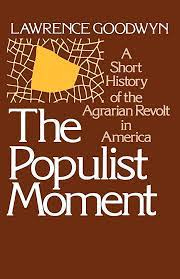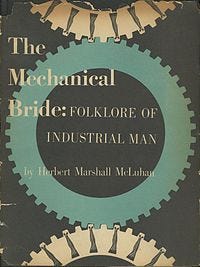
Discover more from Life in the 21st Century
For many years, I thought with all the patriotic bluster of Americans, they would not let their great experiment in democracy simply decline and disappear. At some point they'd stand up and declare “enough” and at least attempt reform. Over time, I’ve become more and more skeptical of seeing it. At this point, the idea of democracy is so little understood, a general consensus on its meaning so lacking, as a political term it is empty as an advertisement promoting sex, riches, self-satisfaction through the purchase of a car, toothpaste, or phone.
The great historian Lawrence Goodwyn noted this problem a half-century ago in his seminal work The Populist Moment. He writes,
“Accordingly, it is evident that the precise meaning of the word 'democracy' has become increasingly obscure as industrialization has proceeded. …problems inherent in defining democracy underscore the cultural crisis of modern life around the globe.”
How can we have a discussion about, much more a democratic politics, if we hold no common idea of democracy? Certainly it has little to do with what today is promoted as democracy by America's political class, corporate oligarchs, and tech titans, though thankfully the last two rarely use the term, they’re more concerned with the rule of “markets,” as nebulous a meaning in its own right. Goodwyn wrote of the greatest cultural dysfunction impeding democratic politics I’ve personally witnessed across my life, the decline of political participation among the American citizenry. He writes,
“Indeed, traditionalists in a number of societies have often pointed in glee to this passivity, choosing to call it 'apathy' and citing it as a justification for maintaining things as they are. …'The masses' do not rebel in instinctive response to hard times and exploitation because they have been culturally organized by their societies not to rebel. They have, instead, been instructed in deference. Needless to say, this is the kind of social circumstance that is not readily apparent to the millions who live within it.”
The concepts of “rebel” and “masses” are unfortunate terms, unhelpful anachronisms in many ways for talk about democracy in the 21st century. Much more important to our era is the inexplicable social deference to power, power best represented by celebrity, wealth, and to a lesser extent “experts.”
Goodwyn continues,
“People do not believe they can do much “in politics” to affect substantively either their own daily lives or the inherited patterns of power and privilege within their society. … In America mass resignation represents a public manifestation of a private loss, a decline in what people think they have a political right to aspire to -- in essence, a decline of individual political self-respect on the part of millions of people.”
And there is the nut. Americans have no idea and little sense of what it is to be a democratic citizen. When our institutions, and lets pick an easy one here, the presidency, remove all power away from the citizen and call for debauched deference to an individual (or is it deference to a debauched individual?), who one after the other reveal the institution to be not simply entirely undemocratic and ever more inhuman. The lack of political self-respect has always completely confounded me, a nullity allowing and fostering the ridiculous reality-tv now passed off as politics.
The Populist Movement was one of the great democratic movements of American and global history. It was yeoman farm America attempting to keep their political and economic enfranchisement against the great brute and brutal forces of industrialism. They lost, democracy in America began its long decline. Goodwyn writes of industrialism triumphant, “The lack of visible mass political activity on the part of modern industrial populations is a function of how these societies have been shaped by the various economic or political elites who fashioned them.” Rereading Marshall McLuhan, I came across a similar diagnosis of America's industrial democratic afflictions, but one that astutely focuses on the political role of technology. Not that Goodwyn and the Populists didn’t understand, indeed much better than us, the political role of technology. After all the Populists were figuring and fighting about democratic control of a very old technology — money and one of the newest — the railroads. Six decades after the Populists, McLuhan writes in The Mechanical Bride: Folklore of Industrial Man,
“The ordinary person senses the greatness of the odds against him even without thought or analysis, and he adapts his attitudes unconsciously. A huge passivity has settled on industrial society. For people carried about in mechanical vehicles, earning their living by waiting on machines, listening much of the waking day to canned music, watching packaged movie entertainment and capsulated news, for such people it would require an exceptional degree of awareness and an especial heroism of effort to be anything but supine consumers of processed goods.”
McLuhan and Goodwyn described the same mid and late 20th century political afflictions, demanding the question of how in a new age of technology — the era of brute force compute and infinite information — a revival of democracy might be initiated? Democracy provides the most effective and capable ways to best utilize these new technologies, simultaneously providing the structure to reverse the vast and wide environmental damages inflicted by industrialism. So pay no attention to what's sold as the political show, especially as the ridiculous quadrennial main event fires up. 21st century democracy requires a complete reorganization of industrial society, starting by organizing the citizenry. Politically organizing the citizenry and understanding technology’s defining role are essential first steps to initiate a democratic future. “The masses” must become individual citizens, not rebelling against, but cooperating together.
Subscribe to Life in the 21st Century
History, Science, Energy, Technology, Environment, and Civilization














Witness the almost complete disappearance of the family farm and the brutal consequences that has had for both animals and humans.
I don't know the statistics offhand but certainly everything I see from my green and animal groups indicates that big agra has completely crushed small family farms. And yet the quaint picture of the small family farm is used to crush animal rights legislation.
By now it is mostly brutal cafos with badly treated, poorly paid workers.
Great essay. I've read The Populist Moment more than once. Many liberal academic historians write off or minimize Populism after they ferret out some hint of racism. This reflects the contempt modern liberals have for the working class and especially rural workers from the South and Midwest. Jill Lepore takes Populists to task for not attacking Jim Crow, but Thomas Frank, in his book on Populism quotes MLK as saying that Jim Crow was a reaction of the southern elites to black and white workers organizing in the Populist movement. I look forward to your next post.